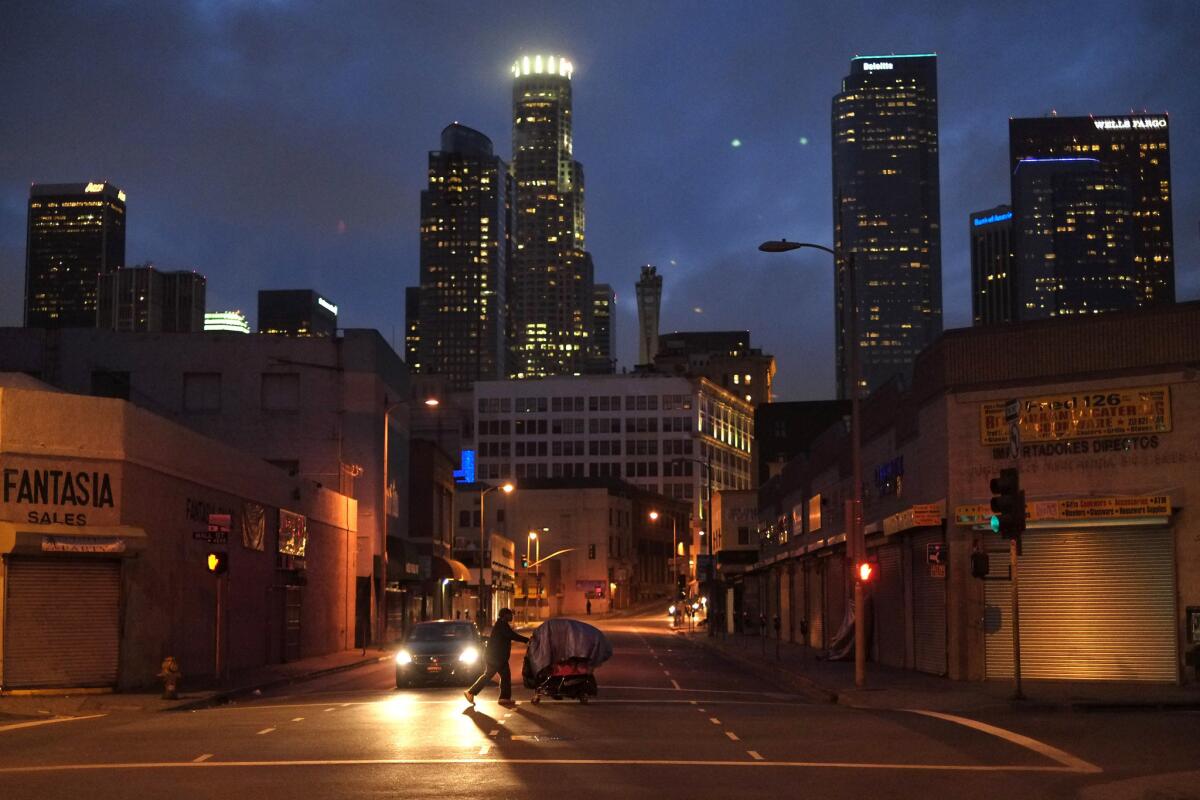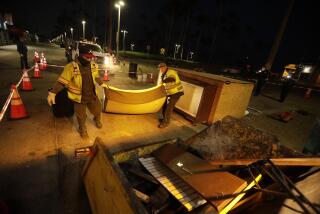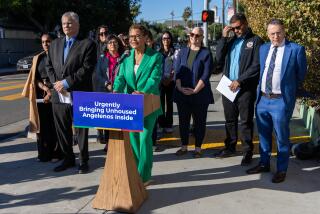Column: Has L.A.’s economy come back?

Among those who know Los Angeles’ economy best, there is one point of agreement: The city is slowly recovering from the 2007 collapse. It was seven years ago that a national housing and financial crisis triggered the worst economic downturn of this generation, and it hit L.A. hard. Unemployment soared to more than 13%; today, it is at roughly 8.7%. That is still high by historical standards, but things are steadily improving.
Beyond the agreement on that large trend, however, there is debate over where we are headed, over how best to encourage growth and over how to confront the recovery’s worrisome unevenness. Some observers believe government intervention is the only way to correct an alarming economic stratification, while others contend that such interventions, including the kind of hike in L.A.’s minimum wage that Mayor Eric Garcetti is expected to propose Monday, would help some workers but cost others their jobs.
In the spirit of Labor Day, here are some thoughts on the local economy from a variety of people who track it closely.
“It’s not like we’re firing on all cylinders,” said Robert Kleinhenz, chief economist for the Los Angeles County Economic Development Corp., “but we’re getting pretty close to that.”
Kleinhenz points to encouraging activity in entertainment, goods movement, aerospace and fashion — mainstays of the Southland economy. Jobs also are being added, he said, in professional business services and tourism — hotel and restaurant workers. Slowly, Angelenos are returning to work.
But they’re not all thriving.
“I think without a doubt that for the bottom, low-wage workers, life is getting worse,” said Maria Elena Durazo, chief of the Los Angeles County Federation of Labor. Almost half of all residents of this area make less than $15 an hour, she added, and many lose much of that to wage theft — employers who force workers to put in unpaid hours. Some, she said, such as car wash workers, simply don’t get paid at all, relying solely on tips.
Why do they put up with it? In many cases, they are in the country illegally and fear deportation. Some employers hire them and then, before ever paying them, call authorities to have them deported. It is, as Durazo said, “part of their business plan.”
I’ve known Durazo a long time. She’s a tough optimist, a fighter. When we talked last week, though, she sounded far more worried than usual.
“It’s true,” she said. “I am very worried about how deep the poverty is.” The current economy, she added, “reminds me of 1992,” the year that Los Angeles exploded in riots.
Her fears about inequality are echoed in some unexpected quarters. Neel Kashkari, the Republican candidate for governor, is campaigning largely on the contention that Gov. Jerry Brown has done too little to address poverty; Mitchell Englander, the lone Republican on the Los Angeles City Council, describes the local economy as “at a very sensitive point right now.”
Englander argues, sensibly, that Los Angeles chases away jobs with its idiotic business tax, which is calculated based on gross, rather than net, receipts. City leaders are cautiously trying to do away with that tax, but it generates lots of revenue, making it a hard habit to kick.
And what do people think about Garcetti’s expected proposal for a city minimum wage? Unsurprisingly, Durazo backs that idea, as do many others who are concerned with the lives of the working poor. But others worry that the move could come with significant costs. Businesses forced to pay workers more might respond by laying others off. Or businesses might relocate from Los Angeles to nearby cities that Garcetti can’t persuade to join in hiking their minimum wage.
Gary Toebben, president of the Los Angeles Area Chamber of Commerce, favors promoting growth and competition to create upward pressure on salaries. He’d like to see Garcetti continue to reach out to businesses in trouble, to lure new companies and help existing ones, and to encourage mixed-use development. As a model, Toebben points to San Francisco’s Mission Bay development, where the city has combined research, housing and city services in a prosperous new area near the home of the Giants.
Everyone I spoke to highlighted L.A.’s formidable resources: great universities, cultural diversity, weather. They provide room for hope but sometimes allow local leaders to be complacent about job creation.
In that vein, Toebben left me with a memorable depiction of this region. Los Angeles, he said, is like a kid from a wealthy family who inherited a bunch of money and, just because he still has some, thinks he’s done great for himself.
Los Angeles simply can’t afford to be complacent.
Twitter: @newton_jim
More to Read
A cure for the common opinion
Get thought-provoking perspectives with our weekly newsletter.
You may occasionally receive promotional content from the Los Angeles Times.







